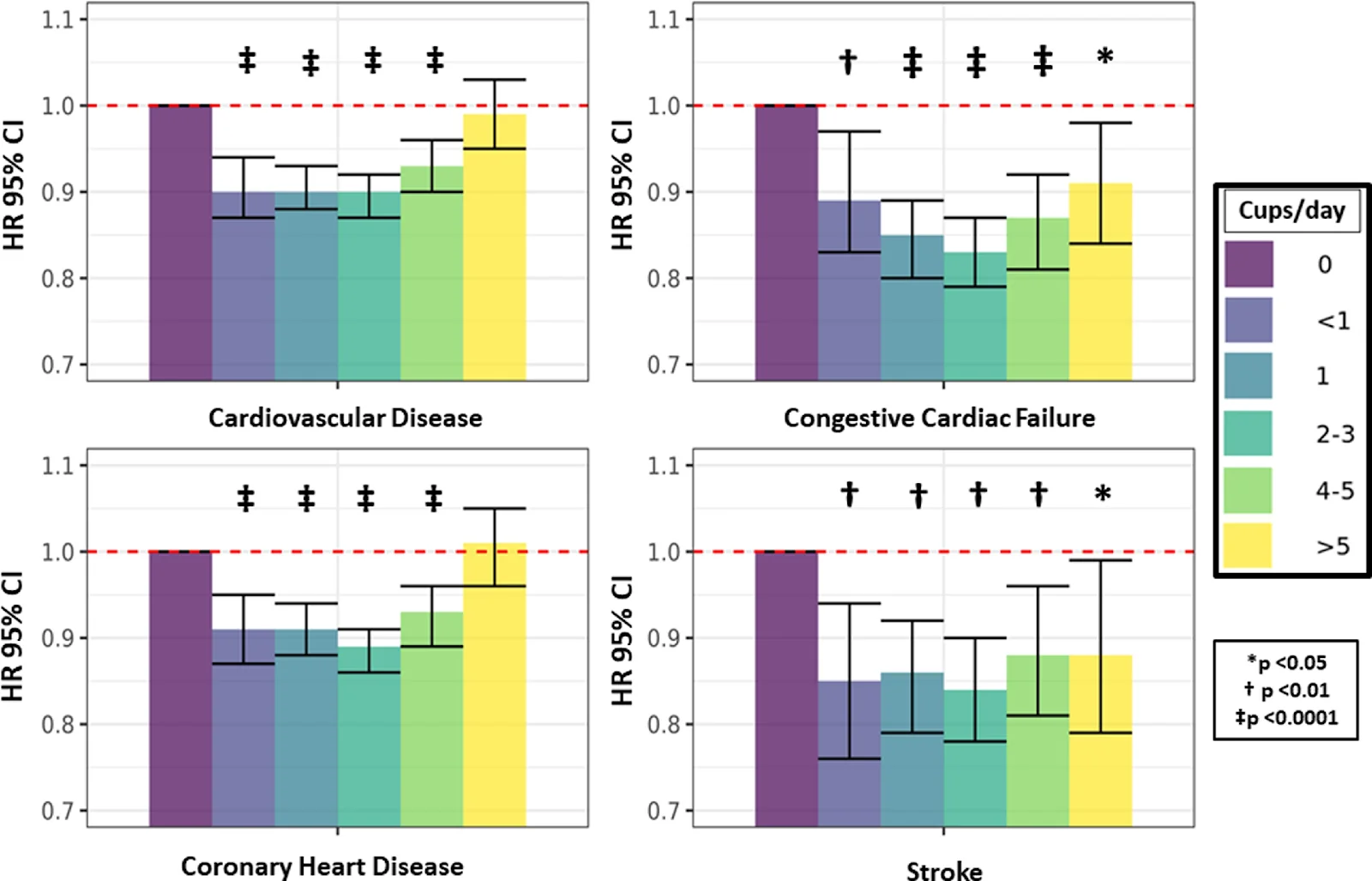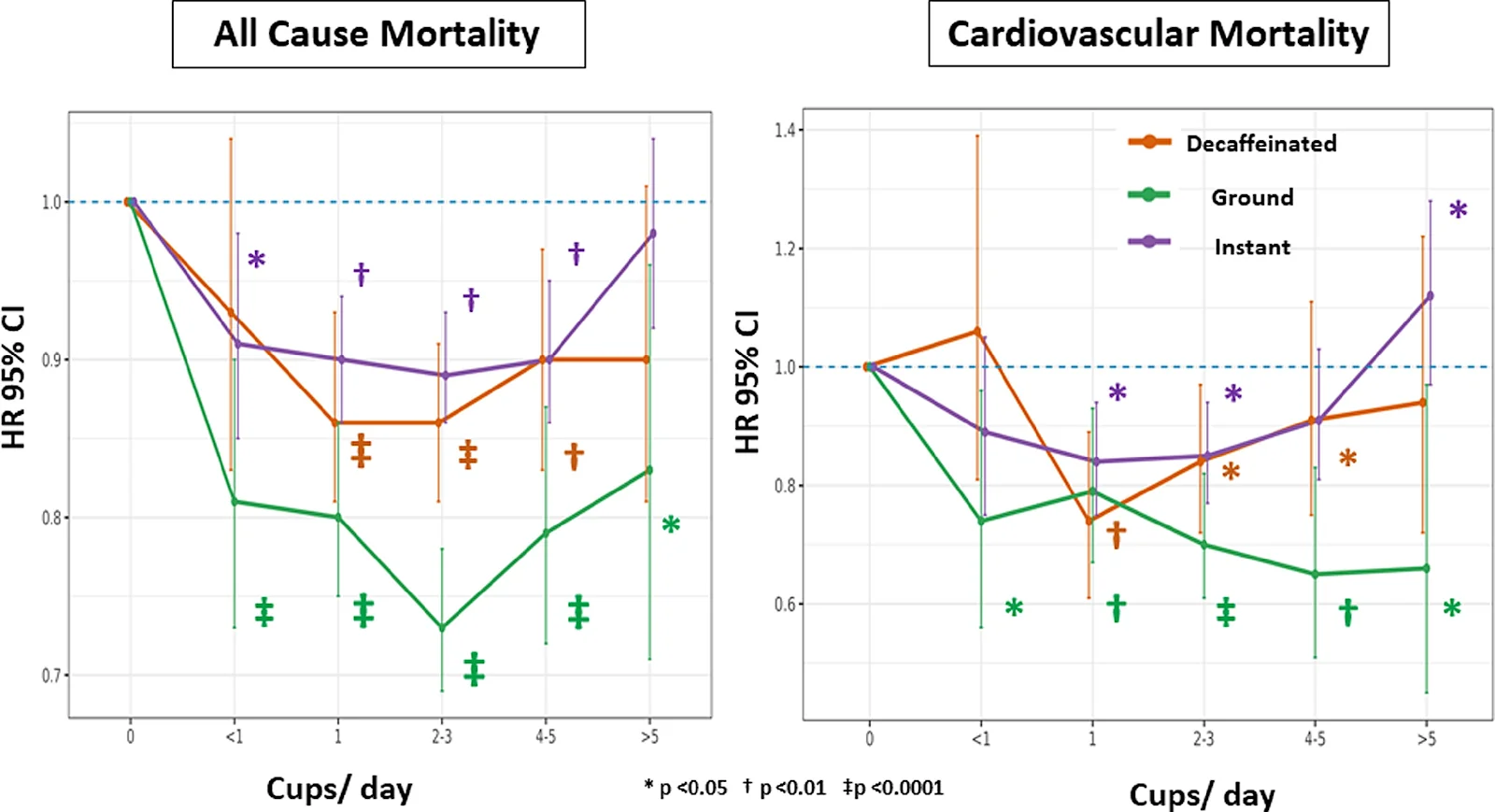Coffee Is Associated with Better Cardiovascular Health
- Ground, unprocessed coffee appears to be the healthiest.

Drawing on data from UK Biobank, scientists have once again confirmed the association between coffee and better health outcomes, with ground coffee emerging as the healthiest type [1].
Bad rap no more
Coffee was once considered rather unhealthy. One study from 1988 found that 80% of physicians recommended avoiding coffee to their patients with cardiovascular problems [2], which may be because coffee may transiently elevate blood pressure. However, in recent decades, evidence to the contrary has been steadily accumulating. While the vast majority of this data comes from population studies [3] that can be flawed in many ways, it has become impossible to ignore.
Today, the European Society of Cardiology considers drinking 3-4 cups of coffee a day to be moderately beneficial, and the American Heart Association notes that the evidence for coffee’s health benefits “stacks up quickly”. Coffee is also associated with a lower risk of type 2 diabetes [4] and Parkinson’s disease [5].
There’s coffee, and there’s coffee
While caffeine is by far the most well-known ingredient in coffee, coffee contains more than a hundred biologically active chemicals, including polyphenols, which are potent antioxidants. To elucidate coffee’s effects on health, it would be interesting to compare various types of coffee, including decaffeinated, which is what this new study published in the European Journal of Preventive Cardiology does.
Like many recent studies, this one makes use of UK Biobank, a huge open repository of various health data on around half a million of British citizens. The sheer size of UK Biobank allows researchers to control for many confounding variables while maintaining considerable statistical power. In this case, covariates included age, gender, ethnicity, BMI, comorbidities such as hypertension and type 2 diabetes, and the lifestyle risk factors of smoking, tea consumption, and alcohol consumption. Participants with a cardiovascular diagnosis at baseline were excluded. The participants’ median age was 58 years, and the median follow-up period was 12.5 years.
Most importantly, the study considered three popular types of coffee, ground, instant, and decaf, pitching them all against coffee abstinence. Participants were only able to select one type of coffee, which was a limiting factor, but probably not a critical one. The participants were grouped into six daily intake categories: 0 daily cups of coffee (control), less than 1, 1, 2-3, 4-5, and more than 5.
Up to 27% risk reduction
In line with most existing studies, coffee consumption was shown to be generally beneficial. Coffee intake of up to 5 cups per day was associated with significant reductions in the risks of cardiovascular disease, congestive cardiac failure, coronary heart disease, ischemic stroke, and various arrythmias. The lowest hazard ratio (equivalent to biggest risk reduction) was detected in the 2-3 cups per day group.

Ground coffee consistently outperformed the other two types, including with arrythmias, cardiovascular mortality and all-cause mortality. The ideal dose of ground coffee seems to be 2-3 cups per day: people who drank this amount of ground coffee were a full 27% less likely to die from all causes (at least, during the follow-up period) than non-drinkers.

Compelling despite limitations
Every observational study has its limitations. Here, scientists did not control for such important variables as income and education level, physical activity, diet quality, and sleep quality. There were also some glaring differences between various study categories: for instance, there were markedly fewer obese people and people with hypertension at baseline among ground coffee drinkers versus instant coffee drinkers.
In the control category of non-drinkers, there were many more females, which could skew the results as well (females have fewer incidences of cardiovascular disease, but higher mortality when it happens). Finally, although UK Biobank is a great source of data, results derived from it may not apply to all ethnic and cultural groups.
Despite those limitations, the picture drawn by this study is compelling and in line with previous research: moderate coffee consumption looks like a sensible choice that may confer certain protection against cardiovascular disease and all-cause mortality.
Conclusion
This study differs from several previous ones in that it stratifies coffee by types, showing that not all of them are created equal. Ground coffee, the least processed of all, also seems to be the healthiest, and 2-3 cups a day of it appears to be the best dose. However, as the authors themselves note, not everyone has the same reaction to coffee, due to genetic and other differences, so you should listen to your own body before you decide to pour yourself an extra cup.
Literature
[1] Chieng, D., Canovas, R., Segan, L., Sugumar, H., Voskoboinik, A., Prabhu, S., … & Kistler, P. M. (2022). The impact of coffee subtypes on incident cardiovascular disease, arrhythmias, and mortality: long-term outcomes from the UK Biobank. European Journal of Preventive Cardiology.
[2] Hughes, J. R., Amori, G., & Hatsukami, D. K. (1988). A survey of physician advice about caffeine. Journal of Substance Abuse.Chicago
[3] Voskoboinik, A., Koh, Y., & Kistler, P. M. (2019). Cardiovascular effects of caffeinated beverages. Trends in cardiovascular medicine, 29(6), 345-350.
[4] Van Dam, R. M., & Hu, F. B. (2005). Coffee consumption and risk of type 2 diabetes: a systematic review. Jama, 294(1), 97-104.
[5] Hu, G., Bidel, S., Jousilahti, P., Antikainen, R., & Tuomilehto, J. (2007). Coffee and tea consumption and the risk of Parkinson’s disease. Movement disorders: official journal of the Movement Disorder Society, 22(15), 2242-2248.







